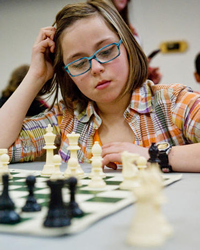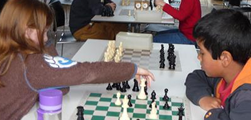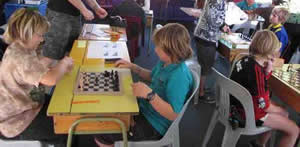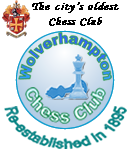The beginner's section is laid out likea teaching scheme - treat it as a syllabus that can be followed in the order it is written!
 To teach chess effectively you will need to allow children to prograss at a pace that suits them; too slow and they will get bored, too fast and they will become disillusioned with the game.
To teach chess effectively you will need to allow children to prograss at a pace that suits them; too slow and they will get bored, too fast and they will become disillusioned with the game.
It is not easy to teach a group how to play chess as each child will progress at his/her own rate.Ideally each child would need to be taught on a one-to-one basis. However, learning how to identify the pieces and their symbols, how to move the pieces and set up the board are simple to do as a full class activity.
I have incorporated a range of 'assets' that can be used to occupy the children in the first few weeks with activities that will give the quick learners something fun to do while giving the slower learners a chance to absorb the basics. Use quizzes and interactive means to ensure everyone knows the basics before you move on.
Everyone can achieve! Use 'can-do' certificates to encourage that feeling of achievement. Remember, some will show a real flair, whereas others will probably never be great players; but hat does not matter as long as they have fun. Make it clear that the club is for everyone to have fun, but those that love the game can have a chance of being competitive.
 Once the children have grasped the basic rules and begin to play each other it is important that you keep a tally of how they get on when playing each other. They do not need to be told who is best. They will know! But publishing the list will not be beneficial to those at the bottom of it. The weaker ones can play each other and develop at their own rate. You will be surprised how some suddenly 'catch on' and become more proficient players after a slow start. Make sure you don't lose the ones that appear at first to have little skill at the game.
Once the children have grasped the basic rules and begin to play each other it is important that you keep a tally of how they get on when playing each other. They do not need to be told who is best. They will know! But publishing the list will not be beneficial to those at the bottom of it. The weaker ones can play each other and develop at their own rate. You will be surprised how some suddenly 'catch on' and become more proficient players after a slow start. Make sure you don't lose the ones that appear at first to have little skill at the game.
You need the full data on how they have performed against each other as you need to match ability when choosing who plays who. Evenly matched children will give each other a better game. So ensure your 'register' not only keeps note of who attends - but also who they play and how they do (result, number of moves and time the game takes is a good indicator!). Once they can fill in score sheets this task is easier for you as they will record on paper what you need to know - you can keep their sheets in a file.
 The keen ones can volunteer to do a knock-out in-house tournament. Get each child to play with every other child in the volunteer group. Get each pairing to play each other twice (first black-white then white-black). Score 2 for a win and 1 for a draw. Carefully record the outcome. At the end you will have a score-list that when toltalled will give you a rough guide to the strength of your players. Then, when you go into chess tournaments with other schools you will be able to easily nominate your Board 1, Board 2 etc. players for the team.
The keen ones can volunteer to do a knock-out in-house tournament. Get each child to play with every other child in the volunteer group. Get each pairing to play each other twice (first black-white then white-black). Score 2 for a win and 1 for a draw. Carefully record the outcome. At the end you will have a score-list that when toltalled will give you a rough guide to the strength of your players. Then, when you go into chess tournaments with other schools you will be able to easily nominate your Board 1, Board 2 etc. players for the team.
Once you have players that know what they are doing you can request help from the local Chess Club. Your town/village will have a club that will willingly send in experienced players to do a bit of coaching - play your most adept players and give them some hints and encouragement.
You will then be ready to contact other schools and get involved in local chess matches.






 To teach chess effectively you will need to allow children to prograss at a pace that suits them; too slow and they will get bored, too fast and they will become disillusioned with the game.
To teach chess effectively you will need to allow children to prograss at a pace that suits them; too slow and they will get bored, too fast and they will become disillusioned with the game. Once the children have grasped the basic rules and begin to play each other it is important that you keep a tally of how they get on when playing each other. They do not need to be told who is best. They will know! But publishing the list will not be beneficial to those at the bottom of it. The weaker ones can play each other and develop at their own rate. You will be surprised how some suddenly 'catch on' and become more proficient players after a slow start. Make sure you don't lose the ones that appear at first to have little skill at the game.
Once the children have grasped the basic rules and begin to play each other it is important that you keep a tally of how they get on when playing each other. They do not need to be told who is best. They will know! But publishing the list will not be beneficial to those at the bottom of it. The weaker ones can play each other and develop at their own rate. You will be surprised how some suddenly 'catch on' and become more proficient players after a slow start. Make sure you don't lose the ones that appear at first to have little skill at the game. The keen ones can volunteer to do a knock-out in-house tournament. Get each child to play with every other child in the volunteer group. Get each pairing to play each other twice (first black-white then white-black). Score 2 for a win and 1 for a draw. Carefully record the outcome. At the end you will have a score-list that when toltalled will give you a rough guide to the strength of your players. Then, when you go into chess tournaments with other schools you will be able to easily nominate your Board 1, Board 2 etc. players for the team.
The keen ones can volunteer to do a knock-out in-house tournament. Get each child to play with every other child in the volunteer group. Get each pairing to play each other twice (first black-white then white-black). Score 2 for a win and 1 for a draw. Carefully record the outcome. At the end you will have a score-list that when toltalled will give you a rough guide to the strength of your players. Then, when you go into chess tournaments with other schools you will be able to easily nominate your Board 1, Board 2 etc. players for the team. DISCLAIMER: The information given in this site is presented in good faith, but the site-author is human and does make mistakes! Should you find anything that you believe is in error please notify the Webmaster of your finding.
DISCLAIMER: The information given in this site is presented in good faith, but the site-author is human and does make mistakes! Should you find anything that you believe is in error please notify the Webmaster of your finding.